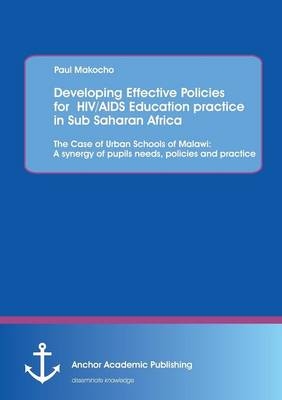
Developing Effective Policies for HIV/AIDS Education practice in Sub Saharan Africa: The Case of Urban Schools of Malawi: A synergy of pupils needs, policies and practice
Anchor Academic Publishing (Verlag)
978-3-95489-212-9 (ISBN)
The findings suggest that in future, effective HIV/AIDS Education needs to be informed by the pupils needs. To address these needs, support from the wider society and related policies, coupled with appropriate management and classroom practice will be required. The book is therefore an indispensable tool for education systems in Sub Saharan Africa. It provides an effective model for the development of effective HIV/AIDS policies and practices in HIV/AIDS education curricula.
Dr. Makocho holds a PhD in Science Education from one of the UK s top ten universities, the University of Leeds.He has a teaching experience spanning 30 years in primary, secondary, college and university levels of Education in Malawi. This vast experience has given him an edge among both writers and stakeholders in the development of HIV/AIDS education policies and practices for systems of education. He is currently a chief lecturer in Science Education at Domasi College of Education in Malawi.
Text Sample:
Chapter 2.3.8, Supporting teachers:
Teachers are key players in HIV/AIDS education as evidenced by the various roles they play. They are important sources of information and skills, confidants to young people, role models, mentors and custodians of healthy school environments (UNESCO, 2008b). Despite their critical roles, they are often left unsupported. Most ministries of education focus on learning and curriculum (UNESCO, 2008b); the teachers unions are not consulted and teachers face widespread stigma and discrimination in the teaching work places where HIV/AIDS policies are undeveloped (UNESCO, 2008c). Given this scenario UNESCO (2008b) identifies a number of issues that need to be addressed to ensure that teachers are effectively supported.
Promoting teachers awareness of the needs of their learners and their environments:
This awareness for teachers is two-pronged. They need to be aware of and informed of the prevailing HIV risky behaviours among young people and the reasons or the beliefs that facilitate them. A number of studies on young people have shown that they engage in risky behaviour because they do not consider themselves likely to contract HIV. A study by Cliffs, et al (1989) found that young people estimated their own risk of contracting HIV lower than that of their peers. In Botswana, a study showed that the majority of young people believed there is either a traditional or a modern medicine that prevents an individual from contracting HIV (Sekgoma, 1994). A study undertaken in Zambia (Garbus, 2000) revealed that the youth did not regard AIDS as a threat to their lives. These studies underline the urgent need for effective HIV/AIDS education to help young people perceive the dangers of unprotected sex. In the absence of perceived risk, the perceived costs of using a condom loss of pleasure, expense, interruption of lovemaking-may be seen as greater than any benefits (Naidoo and Wills, 2000 p. 224). Information on contextual factors facilitating the spread of HIV among young people is, therefore, vital when helping teachers to develop strategic pedagogical approaches aimed at dealing with the same.
Training of teachers and provision of on-going support:
Before educators can help learners to acquire skills necessary for prevention of HIV infection, they themselves must acquire skills to employ participatory learning activities to enable their learners to develop the necessary social skills (UNESCO, 2008c). According to UNESCO (2008a), current efforts to develop effective HIV/AIDS education curricula for pupils far outweigh the same for training teachers of HIV/AIDS education. For instance, in Malawi, where this study was conducted, no formal training in HIV/AIDS education took place at the teacher training colleges and no in-service training was conducted in 2007 (UNESCO, 2008a). Despite the infusion of topics on LS and SRH in the social studies curricula at Domasi College and Chancellor College (Chakwera and Gulule, 2007), HIV/AIDS education is not a standalone curriculum in any Malawian teacher training college.
One of the best ways to ensure that many teachers are equipped with skills for effective HIV/AIDS education is to integrate HIV/AIDS education into pre-service and in-service training for teachers. Successful efforts in this regard are the CARICOM HFLE Project in Trinidad and Tobago, the Pre-and in-service Life Skills training for teachers in Vietnam, the Pre-service Life Skills Education for primary schools in Zimbabwe, and the SHAPE (Strengthening Partnerships in Education) programme in Ghana (UNESCO, 2008b). Lessons from these initiatives showed that there is need for teachers to examine their own values, attitudes and beliefs before they can help the learners develop the same. However, as members of their own societies and cultural settings, teachers may feel uncomfortable when addressing issues about sex in the same way society in general is reluctant to focus on HIV (UNESCO
| Erscheint lt. Verlag | 13.11.2014 |
|---|---|
| Zusatzinfo | 56 Abb. |
| Sprache | englisch |
| Maße | 155 x 220 mm |
| Gewicht | 405 g |
| Themenwelt | Sozialwissenschaften ► Soziologie ► Allgemeine Soziologie |
| ISBN-10 | 3-95489-212-X / 395489212X |
| ISBN-13 | 978-3-95489-212-9 / 9783954892129 |
| Zustand | Neuware |
| Informationen gemäß Produktsicherheitsverordnung (GPSR) | |
| Haben Sie eine Frage zum Produkt? |
aus dem Bereich


